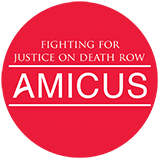
Every Amicus intern I met during my 18 months in America was so keen, they hoped to return; a sentiment I fully endorse as I return to England and begin saving for my next internship! In 2012, I spent three months as their first foreign volunteer with a small death penalty resource centre in Philadelphia. I returned in August 2016 and undertook capital work as well as helped with juvenile life without parole (JLWOP). The office had been involved with this since 500 juvenile lifers became eligible to apply for parole in the state due to the Miller and Montgomery decisions.
Before leaving Philadelphia, I twice witnessed the extensive delay in Pennsylvanian court cases but was lucky enough to see them through to conclusion. One of our clients was sexually abused as a child by older men. He killed one of his abusers when he was 17, incurring a lesser sentence because the jury was told of the sexual relationship. Only months after he turned 18, he murdered a second man, for which he was sentenced to death. In 2012, I attended a court hearing just days before the client was due to be executed, having lost all his appeals. The judge stayed his execution, overturned his death sentence and granted a new sentencing hearing so the jury could hear mitigating evidence that had been suppressed by the District Attorney (DA).
Over five years later, I observed the re-sentencing hearing, again in front of the same judge. It was emotional for all participants as the victim’s daughter wished to address the court on the impact of the loss of her father, and the client testified tearfully to his remorse. The judge said she did not have much discretion but sentenced him to life without parole. The client was again represented by a phenomenal lawyer who will be speaking at Amicus’ Spring Training 2018.
I participated, in my own small way, in another case in 2012 during my first internship. Bryan Stevenson of the Equal Justice Initiative (EJI) had successfully argued before the U.S. Supreme Court in Miller v Alabama that juvenile defendants could not be sentenced to life without the possibility of parole before first considering their personal circumstances and culpability. I caught a train to Media and filed a Motion with the Clerks’ Office in Delaware County Courthouse on behalf of Trina Garnett. Appeals had to be raised within 60 days of Miller so this being Bryan Stevenson’s first Pennsylvanian juvenile client and with only a day to go before the deadline, I felt honoured that the task of delivering the Motion was entrusted to me.
This month (February 2018), I returned to Media Court to watch Marc Bookman, from ACCR and an attorney from EJI, put forth at Trina’s re-sentencing hearing that she should be immediately eligible for parole. Trina was convicted of killing two boys in a house fire whilst aged 14 in 1976. Her story is particularly traumatic, including being raped by a guard when she was 16. However, after 41 years in prison she is now experiencing freedom. Trina is featured in Bryan Stevenson’s book “Just Mercy,” and is also included in an especially touching TED Talk video with Trina and her friends in Muncy Prison:
https://www.ted.com/talks/the_lady_lifers_a_moving_song_from_women_in_prison_for_life
In September, ACCR held its biennial fundraiser at which Bryan Stevenson was a guest of honour. Tying up with my previous blogs, another special guest was Ricky Olds who was released from prison after nearly 40 years when Marc Bookman fought ferociously for his release. It was a genuine pleasure to meet Ricky in person and several other clients released from death row and JLWOP sentences.
Particularly moving for me was recently being invited to a “Montgomery Anniversary Party” run by a couple of juvenile law charities. Two years ago, Marsha Levick took a case to the Supreme Court (Montgomery v Louisiana) arguing that Miller should apply retroactively. The party was for everyone involved in JLWOP work and juvenile lifers. Over 70 people have already been released in Philadelphia and the volume of requests for assistance is overtaking death penalty work now that the number of capital cases (excluding habeas) in the state of Pennsylvania has dropped to less than 50. In my blog last year, I spoke of visiting Chester Prison for a ‘Family Reunification Day’ where 11 juvenile life clients and family members were trained on how to prepare for Parole Board hearings and eventual release. To my delight, at the party which was attended by many juvenile lifers I met two of the men whom I’d previously spoken with in the prison. As always, I find it remarkable how well they adapted to life outside an institution in which they spent majority of their adult years, becoming productive members of society holding down jobs and even driving in Philadelphia traffic!
A couple of personal highs at the end of my internship included driving to Punxsutawney for Groundhog Day and seeing Phil the groundhog predict six more weeks of winter when he awoke at sunrise. Watching the Eagles win the Super Bowl for the first time in history was as exhilarating as attending their victory parade through the streets of Philly with a million other excited residents. Fly Eagles fly!
Before signing off on my last intern blog, good news from Philadelphia is that Larry Krasner is the new DA and avers never to seek the death penalty in the county. Jim Kenney has proven himself to be a compassionate mayor, whom I heard speak at a few JLWOP functions. A man of action not just rhetoric, he demonstrates his support of “returning citizens” in many ways, including considering everyone released from prison as a potential job candidate for the city if they request such. Senator Greenleaf is overseeing a Task Force to abolish the death penalty in Pennsylvania. Although he is up for election soon, Tom Wolf placed a moratorium on executions in his role as governor of the state of Pennsylvania. It is frightening living in America under the current administration but if Philadelphia continues to defend its role as a sanctuary city and works toward eliminating the death penalty in the Commonwealth, maybe there is hope for the future.


